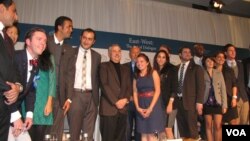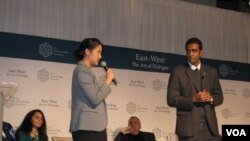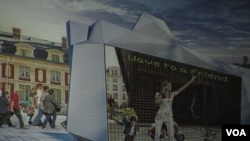In an era of increasing globalization and reliance on impersonal electronic communication, more and more people develop their most lasting impressions through face-to-face encounters. In this context, citizens’ diplomacy becomes a powerful force in bridging cross-cultural differences. With that in mind, Egyptian businessman Shafik Gabr recently launched a new citizens’ diplomacy effort to build bridges between the Arab world and the West.
Gabr’s initiative, “East-West: The Art of Dialogue”, sponsored exchanges between 20 young and emerging leaders in the arts, sciences, law, media and business from Egypt and the United States.
The Egyptian and American young professionals began the citizens’ diplomacy program in Egypt last June. They met with public figures and engaged in intensive discussions, debates and site visits. The program then moved to the United States, including a visit to Washington last week where the fellows met with Obama administration officials, members of Congress, policy experts and business leaders.
The Gabr Fellows examine the mutual challenges and opportunities that the two very different countries share, including economic issues, entrepreneurship, and the role of religion in public life.
“I am struck by the extent to which our two countries’ respective problems are similar, albeit to differing degrees,” said Christina Fallon, an American Gabr Fellow. “In the same manner, there seems to be a common set of core values that the fellows bring to the dialogue.”
Moataz Hussein, an Egyptian Gabr Fellow drew his own conclusion about his counterparts.
“After spending those amazing days with the American fellows, I can say that the East is definitely meeting the West, not only physically, but through surprisingly common challenges as well,” he said.
For Leslie Lang, a senior vice president for strategic development at an American global non-profit medical organization experiencing life in Egypt led to a desire to learn more.
“I became so involved in understanding the waves of popular uprisings in Egypt and developed an interest in following the daily developments after I came back,” she said. Lang also joined a class to learn Arabic.
Moving beyond preconceptions
By giving participants the chance to experience each other’s cultures and societies firsthand, Gabr says he aims to help reverse the erosion of public understanding and trust, and rediscover commonalities between Egypt and the U.S.
According to a Zogby Research Services poll conducted in July, nearly half of Americans have an unfavorable view of Egypt and only one percent of Egyptians have confidence in the U.S.
“Through this initiative, we are engaging with the next generation of leaders from both sides, creating experiences that allow these young professionals to override preconceptions with knowledge and understanding and develop cooperative interaction,” said James Zogby, President of the Arab American Institute, which helped to organize the exchange.
American Fellow Daniel Lansberg-Rodrigues said Egypt is now part of his life.
“Egypt is no longer an abstract concept to me and that makes a powerful difference in how I find myself viewing Egypt after being there,” he said.
“I realized that disagreeing with particular U.S. foreign policies should not be equivalent to disagreeing with an entire nation of very diverse opinions even about these policies,” said Amr Ismael, an Egyptian Fellow who feels he has to explain that to fellow Egyptians.
Joint action projects
To expand the impact of this initiative, the Gabr Fellows developed joint projects which address challenges facing both countries while promoting further East-West dialogue. The projects were presented at an event in Washington recently.
One of those projects, called Shared Distance, provides a forum for real-time cross-cultural interactions between citizens from Egypt and the U.S. through large, interactive TV screens in Cairo and New York.
"I hope that by giving emerging leaders in the Arab world and the West the opportunity to know each other and to talk to each other, rather than at each other, as well as collaborating in joint projects, will create better understanding,” Gabr said.
The fellows also collaborated in joint teams on other project ideas ranging from using comic books to examine common issues to interactive applications that help users develop better understanding between Egyptians and Americans.
Leslie Lang paired with three Egyptian and American Fellows to introduce micro clinics to Egypt, highlighting a shift in U.S. healthcare for treating chronic diseases.
“Egypt ranks among the top 10 countries of the highest rates of diabetes, so does the U.S.,” said Lang. “We worked on a micro clinic model that brings together communities to share access to health care knowledge and education.”
With the apparent success of the inaugural class of Gabr Fellows, the program is getting ready to accept applications from Egyptian and American young professionals to start the second class in April 2014.
Gabr’s initiative, “East-West: The Art of Dialogue”, sponsored exchanges between 20 young and emerging leaders in the arts, sciences, law, media and business from Egypt and the United States.
The Egyptian and American young professionals began the citizens’ diplomacy program in Egypt last June. They met with public figures and engaged in intensive discussions, debates and site visits. The program then moved to the United States, including a visit to Washington last week where the fellows met with Obama administration officials, members of Congress, policy experts and business leaders.
The Gabr Fellows examine the mutual challenges and opportunities that the two very different countries share, including economic issues, entrepreneurship, and the role of religion in public life.
“I am struck by the extent to which our two countries’ respective problems are similar, albeit to differing degrees,” said Christina Fallon, an American Gabr Fellow. “In the same manner, there seems to be a common set of core values that the fellows bring to the dialogue.”
Moataz Hussein, an Egyptian Gabr Fellow drew his own conclusion about his counterparts.
“After spending those amazing days with the American fellows, I can say that the East is definitely meeting the West, not only physically, but through surprisingly common challenges as well,” he said.
For Leslie Lang, a senior vice president for strategic development at an American global non-profit medical organization experiencing life in Egypt led to a desire to learn more.
“I became so involved in understanding the waves of popular uprisings in Egypt and developed an interest in following the daily developments after I came back,” she said. Lang also joined a class to learn Arabic.
Moving beyond preconceptions
By giving participants the chance to experience each other’s cultures and societies firsthand, Gabr says he aims to help reverse the erosion of public understanding and trust, and rediscover commonalities between Egypt and the U.S.
According to a Zogby Research Services poll conducted in July, nearly half of Americans have an unfavorable view of Egypt and only one percent of Egyptians have confidence in the U.S.
“Through this initiative, we are engaging with the next generation of leaders from both sides, creating experiences that allow these young professionals to override preconceptions with knowledge and understanding and develop cooperative interaction,” said James Zogby, President of the Arab American Institute, which helped to organize the exchange.
American Fellow Daniel Lansberg-Rodrigues said Egypt is now part of his life.
“Egypt is no longer an abstract concept to me and that makes a powerful difference in how I find myself viewing Egypt after being there,” he said.
“I realized that disagreeing with particular U.S. foreign policies should not be equivalent to disagreeing with an entire nation of very diverse opinions even about these policies,” said Amr Ismael, an Egyptian Fellow who feels he has to explain that to fellow Egyptians.
Joint action projects
To expand the impact of this initiative, the Gabr Fellows developed joint projects which address challenges facing both countries while promoting further East-West dialogue. The projects were presented at an event in Washington recently.
One of those projects, called Shared Distance, provides a forum for real-time cross-cultural interactions between citizens from Egypt and the U.S. through large, interactive TV screens in Cairo and New York.
"I hope that by giving emerging leaders in the Arab world and the West the opportunity to know each other and to talk to each other, rather than at each other, as well as collaborating in joint projects, will create better understanding,” Gabr said.
The fellows also collaborated in joint teams on other project ideas ranging from using comic books to examine common issues to interactive applications that help users develop better understanding between Egyptians and Americans.
Leslie Lang paired with three Egyptian and American Fellows to introduce micro clinics to Egypt, highlighting a shift in U.S. healthcare for treating chronic diseases.
“Egypt ranks among the top 10 countries of the highest rates of diabetes, so does the U.S.,” said Lang. “We worked on a micro clinic model that brings together communities to share access to health care knowledge and education.”
With the apparent success of the inaugural class of Gabr Fellows, the program is getting ready to accept applications from Egyptian and American young professionals to start the second class in April 2014.










